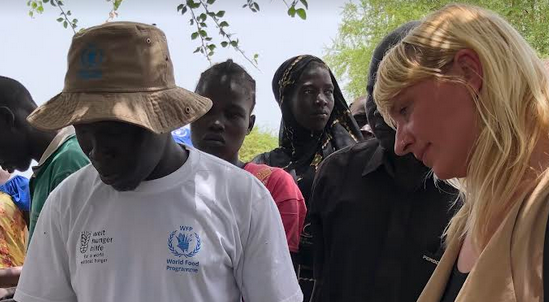The Federal Government Commissioner for Human Rights Policy and Humanitarian Assistance at the German Federal Foreign Office has urged peace partners in South Sudan to implement the peace agreement to the letter and respect fundamental freedoms.
Luise Amtsberg, who concluded a three-day visit to South Sudan on Sunday, 16 April 2023 also held talks with civil society, NGOs, government representatives, parliamentarians, and the UN and discussed Germany’s work in South Sudan, paths out of the humanitarian crisis and ways to improve the human rights situation in South Sudan.
“It was my great pleasure to visit South Sudan and get to know this beautiful country – a country with many challenges but also enormous potential. I am humbled to have had a chance to speak with South Sudanese from all walks of life and learn about their resilience in light of unprecedented food insecurity, ongoing subnational violence, and climate-induced flooding,” she said. “Germany is convinced that the full implementation of the revitalized peace agreement remains crucial. The political parties must expedite their efforts and cooperate in good faith. I am concerned that the latest tensions within the government undermine efforts to implement the agreement and jeopardize the timeline for the constitution-making and electoral processes.”
Amtsberg said South Sudan is at a critical juncture and that as the country prepares for elections, it is vital that the government ensure the meaningful participation of civil society, women, and youth.
“Germany stands ready to continue to support South Sudan on its road towards free, fair, and peaceful elections,” she said. “However, for democratic elections to take place, civic space must be opened up and journalists allowed to operate without fear of intimidation, violence, and arbitrary arrest.”
Amtsberg said she was deeply moved to hear about the hopes and dreams of South Sudanese women and girls that they can live in peace and safety without fear of sexual and gender-based violence and access education, health, and other gender-transformative public services.
“I am deeply concerned by the staggering level of sexual and gender-based violence in South Sudan. The latest reports of the United Nations Commission on Human Rights in South Sudan speak a clear language: Perpetrators – no matter what their position is – must be held to account,” she said. “The implementation of the transitional justice provisions foreseen in the Revitalized Peace Agreement, including the establishment of the Hybrid Court, remains crucial.”
The German official said her country pursues a ‘zero tolerance’ policy towards sexual and gender-based violence and together with its EU partners, recently imposed sanctions on the commissioners of Koch and Mayendit counties who commanded troops, which made systematic use of sexual violence as a war tactic during the conflict in southern Unity State in 2022.
According to Amtsberg, Germany continues to be the second-largest bilateral donor of humanitarian assistance to South Sudan and the largest contributor to the South Sudan Humanitarian Fund.
“Contrary to claims by some, Germany has not reduced its humanitarian portfolio in South Sudan in the wake of the Russian war of aggression against Ukraine. We have not forgotten the millions of South Sudanese who struggle with political instability, food insecurity, and the impact of the climate crisis,” she reassured. “During my visit to Bentiu, I spoke with IDPs and host community members for whom the climate crisis is a harsh daily reality. The unprecedented level of flooding in South Sudan underlines the need for governments and people around the world to prioritize the fight against climate change. Germany will also continue to support sustainable mitigation, adaptation, and resilience measures.”
Regarding attacks on humanitarians, Amtsberg said they do an incredible job at saving lives and delivering much-needed help to people in need across South Sudan and wondered why they continue to be targeted.




